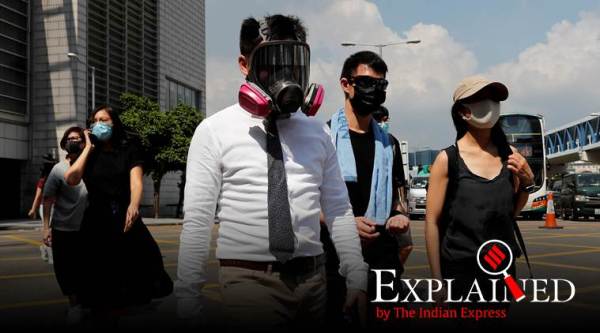Explained: Why Hong Kong has banned masks
The ban on face masks is a relatively mild measure, given the extreme power that the Ordinance allows to the government.
 Anti-government office workers wearing masks attend a lunch time protest, after local media reported on an expected ban on face masks under emergency law, at Central, in Hong Kong, China, October 4, 2019. REUTERS/Tyrone Siu TPX IMAGES OF THE DAY
Anti-government office workers wearing masks attend a lunch time protest, after local media reported on an expected ban on face masks under emergency law, at Central, in Hong Kong, China, October 4, 2019. REUTERS/Tyrone Siu TPX IMAGES OF THE DAY
Hong Kong has invoked the Emergency Regulations Ordinance, a law enacted by its erstwhile colonial British government in 1922, to prohibit protesters from wearing masks during the massive street protests and violence in the territory.
The ban will come into effect at midnight on Friday (9.30 pm India time). It is not clear yet whether it will apply to protesters or to all people, and in which parts of the territory. Hong Kong has a problem of smog and air pollution, and it is fairly common for even ordinary Hong Kongers to wear fairly sophisticated face masks for health reasons.
What is this Ordinance?
The law, as amended last in 2018, “confer(s) on the Chief Executive in Council (Carrie Lam) power to make regulations on occasions of emergency or public danger”.
The Ordinance was originally enacted to break up the famous Seamen’s Strike of 1922, during which Chinese port workers from Hong Kong and Canton (now Guangzhou in the Zhujiang or Pearl River estuary in the Chinese mainland) stopped work to press their demands for raising wages to the levels of foreign workers, paralysing shipping operations and triggering food shortages.
The powers conferred by the law were last used in 1967, when at the time of Mao Zedong’s Cultural Revolution in the mainland, a labour dispute blew up into massive rioting between communist sympathisers and the colonial government of Hong Kong.
The Ordinance gives the Hong Kong government sweeping powers to do virtually anything — “make any regulations whatsoever which (it) may consider desirable in the public interest”, “on any occasion which the Chief Executive in Council may consider to be an occasion of emergency or public danger”.
What is the problem with masks?
Protesters running on the streets, rioting and vandalising property, while wearing masks have become the standard image of the months-old unrest washing over Hong Kong. There was a sharp escalation of the violence and chaos on October 1, China’s National Day.
The government probably hopes that by banning face masks, it would be able to plant the fear of identification, and future retribution by the state, in the minds of protesters, which would act as a deterrence.
Given the determination and refusal to bend that the protesters have shown so far, however, the effectiveness of the proposed deterrence remains to be tested.
Don’t miss from Explained: The Lord as a juristic person: What legal rights do deities enjoy?
How is this measure expected to play out?
The ban on face masks is a relatively mild measure, given the extreme power that the Ordinance allows to the government. The idea appears to be to test the waters, and signal to the protesters that the administration would be willing now to take more drastic steps to rein them in.
The Beijing-backed administration has been more restrained than many expected, but Thursday’s shooting of a teenage protester by police, and now the ban order on masks, may signal an intention to adopt a more hard line. Media censorship, mass detentions or deportations, sweeping seizures of property, curfews, and cancellation of elections may follow as the next steps.
That said, analysts were pointing out Friday that the ban on the masks would not be easy to implement, giving the example of the Yellow Vest protests in France, where protesters have been undeterred by a similar ban.
Also, the ban in Hong Kong would only serve to reinforce the image of the government not being in control of the situation, and to that extent, probably end up hurting its own cause and Hong Kong’s already severely battered reputation for being “safe” for tourists and businesses.
Critics of the decision have warned that the ban signals a sharp slide towards authoritarianism, and is likely to only inflame the crisis further.
Opposition lawmakers have underscored that the protests are not a mere law and order issue that the administration and Beijing have been making it out to be; rather, it represents far more fundamental yearnings for freedom, democracy, liberty, and individual rights.
The government’s powers under the Ordinance can be challenged as being in conflict with Hong Kong’s ‘Basic Law’ constitution that guarantees human rights, and some experts were saying that it was a mistake to assume that those rights can be overridden by executive fiat.
- 01
- 02
- 03
- 04
- 05






































